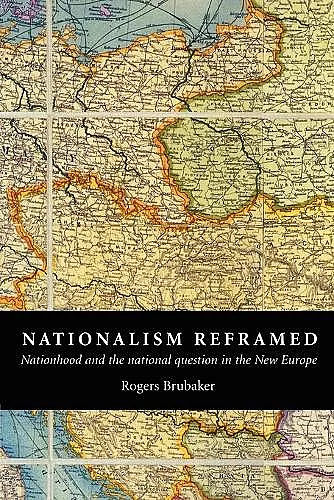Nationalism Reframed
Nationhood and the National Question in the New Europe
Format:Paperback
Publisher:Cambridge University Press
Published:28th Sep '96
Currently unavailable, and unfortunately no date known when it will be back
This paperback is available in another edition too:
- Hardback£90.00(9780521572248)

Nationalism Reframed is a theoretically and historically informed study of nationalism in Eastern Europe and the former Soviet Union.
The birthplace of the nation-state and modern nationalism at the end of the eighteenth century, Europe was supposed to be their graveyard at the end of the twentieth. Yet, far from moving beyond the nation-state, fin-de-siècle Europe has been moving back to the nation-state, most spectacularly with the disintegration of the Soviet Union, Yugoslavia, and Czechoslovakia into a score of nationally defined successor states. This massive reorganisation of political space along national lines has engendered distinctive, dynamically interlocking, and in some cases explosive forms of nationalism. Drawing on Pierre Bourdieu and the 'new institutionalist' sociology, and comparing contemporary nationalisms with those of interwar Europe, Rogers Brubaker provides a theoretically sophisticated and historically rich account of one of the most important problems facing the 'New Europe'.
'Brubaker's framing of a 'pas de trois' of the nationalizing state, the national minority population, and the national homeland illuminates brilliantly the political dynamics of nationalism. His concepts and descriptions are historically rich and sociologically compelling. It will no longer be possible for me to write about nationalism without reference to this masterful set of essays.' David D. Laitin, University of Chicago
'This book makes it clear that Rogers Brubaker is the most brilliant of the younger generation of scholars of nationalism. If the great theoretical ingenuity is seen in the creation of a conceptual apparatus designed to handle the interactions of minorities, external national homelands and nationalising states, what is most impressive is the way in which this leads to high-powered substantive discoveries. Policy makers quite as much as academics can benefit from analyses of Central Europe in the interwar period and after 1989, of differences between Weimar Germany and post-communist Russia, and of differential patterns of the ending of empires. This is a rare acheivement, likely to set the terms of debate for many years.' John A. Hall
'In a series of vigorous and rigorous studies of the shifting triadic relations between 'nationalizing states', 'national minorities', and their 'external national homelands' in postimperial Europe and Eurasia, Rogers Brubaker reconfigures and reframes our understanding of the national question - its eclipse, revival, and manifold metamorphoses. Wedding surgical empirical precision with uncanny analytical perspicacity, geographical scope with historical depth, this book is a theoretical breakthrough and clears a new terrain for a reflexive sociology of the ongoing fabrication of everything we subsume under the falsely self-evident name of 'nation'. Pierre Bourdieu, Ecole des Hautes Etudes en Sciences Sociale
'containuing stimulating ideas, and refreshing thoughts and suggestions, it will undoubtedly find a prominent place among the titles concerning the problems of nations and nationalism.' Contemporary European History
ISBN: 9780521576499
Dimensions: 229mm x 152mm x 15mm
Weight: 340g
216 pages